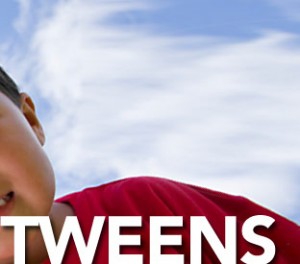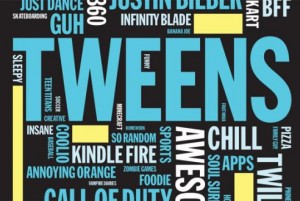 Too old for toys – too young for boys. They’re ‘Tweens!
Too old for toys – too young for boys. They’re ‘Tweens!
You know – that awkward age somewhere between 10 and 14 when girls and boys feel awkward. It’s that point when girls and boys no longer want to be treated like a ‘child’ and start thinking they should be treated as a ‘teen’. Most people tend to think of girls as ‘tweens, but boys go through an awkward time during this stage too.
Parents are still obviously in control of what their kids do, where they go, and who they see – but that doesn’t mean that it doesn’t come without a struggle.
Tweens often see their parents as an ‘anchor’ (that’s tween lingo for “a person who slows down the group or requires constant attention”). They may not like it when you’re “all up in the kool-aid” (a.k.a., “being in someone’s business”).
Tweens have “their own sense of fashion in a way we didn’t have before and their own parts of the popular culture targeted toward them,” says child and adolescent psychologist Dave Verhaagen of Charlotte. How will this shape their personalities? “Time will tell. We don’t know.”
Tweens are inundated by media and marketing – and they have become a major advertising target. Beginning around the late 1990’s and early 2000’s, marketers started targeting children between the ages of 8-12 as a special segment of consumers who were dubbed “Tweens.” They realized these kids wanted to act, look, and feel older – against their parent’s wishes. This created a whole new niche for the market. They began to create products too sophisticated for kids, but not quite yet cool enough for teens.
According to Bloomberg BusinessWeek, Build-A-Bear, Paint Your Own Pottery, and the American Girl Store are just a few US retail stores that were specifically designed for Tweens — and namely Tween girls who typically spend the most money on these types of things.
 Unfortunately, marketing has led to some inappropriate products for kids in this age range too. We also see very heavy marketing of particular ideas about what it means to be a boy or a girl. Gender stereotypes are rampant in the media, and marketing towards Tweens often plays on their hormones and changing bodies – causing embarrassment, conflict, and confusion for many Tweens.
Unfortunately, marketing has led to some inappropriate products for kids in this age range too. We also see very heavy marketing of particular ideas about what it means to be a boy or a girl. Gender stereotypes are rampant in the media, and marketing towards Tweens often plays on their hormones and changing bodies – causing embarrassment, conflict, and confusion for many Tweens.
So what do parents do?
First, learn as much as you can and try to understand what your child is saying. And be sure to maintain appropriate control of your Tween, but allow him/her to have freedom to grow and develop into a healthy teen too. It’s an awkward stage and it takes patience and understanding to help your growing child become a responsible teen — and eventually an adult.
Resources
KidsHealth.org offers these suggestions:
- Respect your child’s privacy – kids need space and privacy too.When you demonstrate trust in your teen, it can help him/her trust you.
- Be aware of what your kids see and read – including where they go on the internet. They’re not old enough for unlimited computer time or other technology. Set reasonable limits and stay alert.
- Make appropriate rules that are enforced. Decide what is acceptable when it comes to family interactions and what is off limits – allowing some flexibility. Decide what’s best for the child when it comes to bedtime, curfew, and other things ahead of time and communicate rules to your Tween.
- Understand what your kids are saying – they use slang that may not be as obvious as your assumptions.
- Commonwealth Parenting offers valuable reosurces for parents, including information on raising Tweens such as their recent seminar on “Let’s Talk About the Tween Years” – see their November 7, 2012 seminar on The Wonder of Girls (Parents of Girls 9-14 Years of Age) – and November 13 Discipline Decisions (Parents of Children 4-12 years).
- Download a copy of the Centers for Disease Control publication, “Audience Insights“, where you’ll learn more about communication, lifestyle, and media habits of Tweens. Click here to access the CDC website and download the document.
- Parenting.org is another website with information on raising Tweens, managing the use of technology, and more.
- Examples of texting abbreviations and explanations of Tween slang words can be found at this link.
- We’ve created a special resource section on raising Tweens on our CompletelyKidsRichmond website. These local resources will help you find safe, fun places for your kids. We’re expanding this information and will include more updates so check back often to see what’s listed. And if you have local resources to include in our Tweens section, please email us at email@completelykidsrichmond.com

 Birthdays
Birthdays